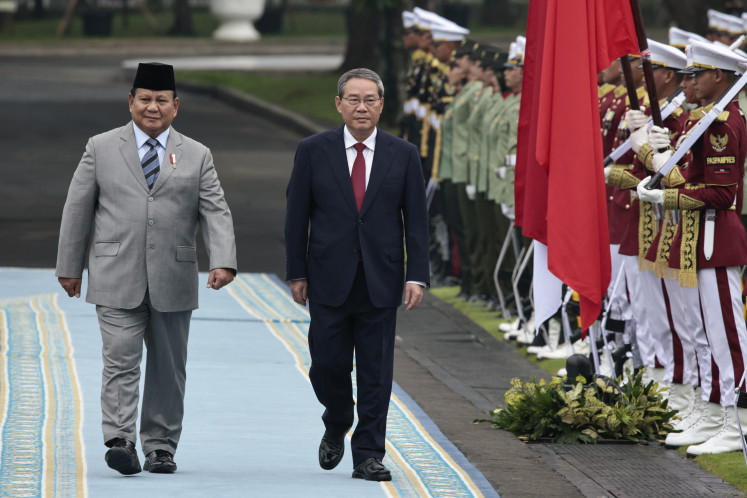Sovereign wealth funds
Lack of confidence in financial markets has driven investors and funds away from corporations
Change text size
Gift Premium Articles
to Anyone

L
ack of confidence in financial markets has driven investors and funds away from corporations. As balance sheets deteriorate, companies are in need of more and more capital, which investors are not willing to provide. In this setting, sovereign wealth funds (SWFs) have emerged as the funding source of the next few years. SWFs manage more than $3,000 billion. To put this figure into perspective, the hedge fund and private equity markets combined account for less than $2,000 billion. Some estimates suggest that SWFs will manage more than $10,000 billion by 2015.
However, SWFs' investment strategies and potential political agendas remain controversial. This article is based on research at IMD covering more than 20,000 SWF holdings across 7,000 companies and covers funds' stock holding in 58 countries' stock markets.
Where do SWFs invest?
Although definitions vary, SWFs are essentially state-owned investment funds that invest in international financial markets. They invest in virtually all countries in the developed world, and a few emerging market economies. As market players, they are certainly a driving force, holding positions in almost one-fifth of companies worldwide. The typical position taken by an SWF is not a controlling stake. On average, an SWF takes 0.74 percent of the shares outstanding in a company. In dollar terms, the average position is $46.3 million. Indeed, their level of control only reaches 50 percent in less than 1 percent of their investments.
Compared with typical companies in the global market, companies held by SWFs are significantly larger, more liquid and have proven records of profitable growth. Companies held by SWFs also tend to have significantly higher institutional ownership and analyst coverage than the rest.
SWFs are often opportunistic. They step into companies when their stock prices fall. They are also more inclined to invest in countries where legal protection of investors is stronger. In other words, they may bring in good governance, but only to the extent that the legal regime guarantees a minimum protection to their investment. As with other non-sovereign investment vehicles (Calpers, the California state pension fund, for example), corporate governance considerations are, therefore, important determinants of SWFs investment strategies.
It is often argued that SWFs invest in western companies as a means of gaining corporate intelligence, but our results show that SWFs do not display any preference for high-tech or research- and development-intensive companies.
Impact on company value
The valuation impact of SWFs is sizeable. Economic analysis shows that in the year when a SWF invests in a company, the ratio of the market value of the company to its book value increases by 15 percent. Put in simple terms, this finding suggests that general shareholders benefit - a lot - from SWFs investing in their companies. Furthermore, the impact of SWFs goes beyond that of the typical institutional investor: the market pays on average a much higher premium for businesses where SWFs have a stake than in organizations which are owned by general institutional investors.
Everything else being equal, the market prefers SWFs to any other institutional investor.
Benefits of SWF ownership
SWFs can be more proactive in the takeover market and block value-reducing acquisitions by the companies they invest in. Because of their interest in share returns, SWFs avoid strategies that purely pursue value-destroying consolidation and scale.
SWFs increase the takeover premiums in the companies in which they invest. In late 2008, Norway's Government Pension Fund opposed a bid by MidAmerican Energy Company (a unit of Warren Buffett's Berkshire Hathaway) for Constellation, in which the pension fund had a 4.8 percent stake. MidAmerican's bid was backed by Constellation's management itself. However, Norway's SWF considered the price insufficient and has since brought MidAmerican to court. As this episode shows, powerful, non-controlling shareholders can exert external pressure.
SWFs can act as efficient internal corporate governance mechanisms, bridging any gap between shareholders and the top executive.
Unlike other types of institutional investors, SWFs provide guaranteed capital in case of future funding needs and, therefore, reduce the uncertainty regarding the company's future financing ability. There are two characteristics of SWFs that make them more desirable than regular institutional investors: they are larger and they do not invest heavily in equities. As SWFs have access to massive funds, the market rewards the unlimited access to capital of the companies in which they invest.
SWFs make companies more valuable because they reduce companies' cost of capital as a result of their commanding lower risk premiums. The opportunity cost of sovereign funds is to invest in risk-free instruments such as US bonds, as was their common practice in the 1980s. Furthermore, relative to their size, a single SWF stake represents a small percentage of a fund's total assets anyway (the typical fund in the sample invests in more than 100 stocks), and the marginal investor of the companies in which they invest becomes a more global, international, less risk-averse investor.
SWFs provide valuable political connections. Brazil has recently established its own SWF, with the stated objective of buffering the country from the global financial crisis and helping Brazilian companies to boost trade and expand overseas. It is likely that such international expansion is spurred by the Brazilian Government's appeal with multinationals and other regulators.
The controversy surrounding SWFs is more political than financial. SWF ownership is usually positively valued by the market, with a premium amounting to about 15% of company value. This suggests that, contrary to claims that SWFs expropriate investors and pursue political agendas, they, in fact, contribute to long-term shareholder value creation and bring about larger value increases than other institutional investors.
Professor Fernandes teaches on the Strategic Finance and Orchestrating Winning Performance programs. Professor Bris is Director of the Strategic Finance program and also teaches on the Advanced Strategic Management, Building on Talent and Orchestrating Winning Performance programs at IMD (www.imd.ch).









